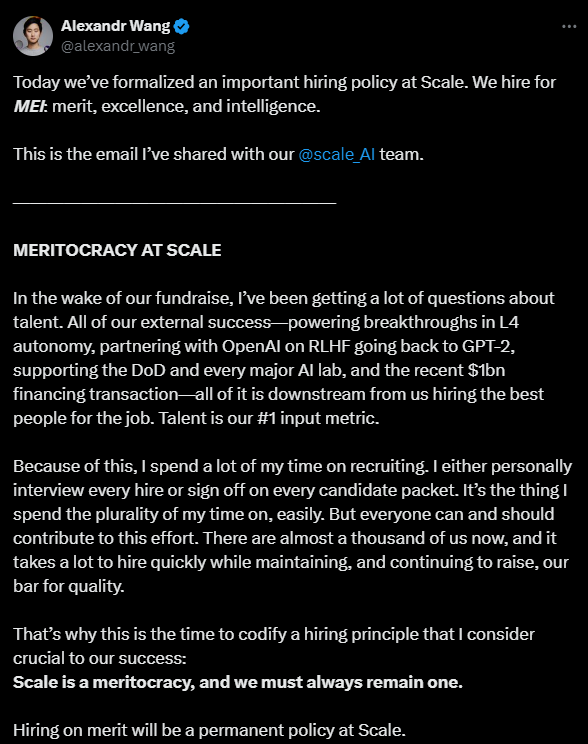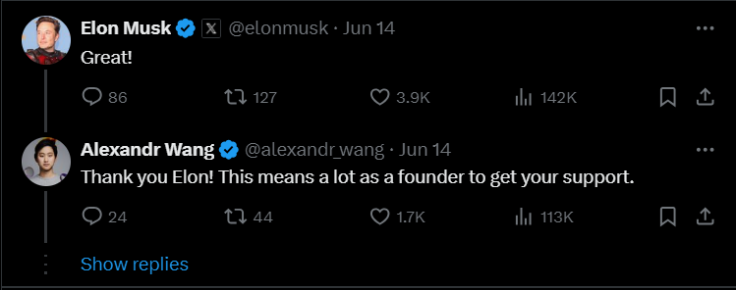Brian Armstrong And Elon Musk Praise Scale AI CEO For Hiring Based On 'Merit', Not 'Woke' Hiring
Scale AI prioritises merit-based hiring, and CEO Alexandr Wang says it will stay that way

Following his announcement of a merit-based hiring policy, the CEO of artificial intelligence (AI) startup garnered praise from fellow industry leaders, including Elon Musk.
On the social media platform X (formerly Twitter), Alexandr Wang, who founded Scale AI in 2016, announced the formalisation of his company's MEI hiring policy – Merit, Excellence, and Intelligence. This contrasts with the more prevalent DEI (diversity, equity, and inclusion) initiatives many other companies adopt.
"Scale is a meritocracy, and we must always remain one. Hiring on merit will be a permanent policy at Scale," he wrote.
Scale AI: Leading The Way In AI Data Solutions
The success of generative AI models hinges on high-quality data. Scale AI, a leader in providing such data, empowers businesses deploying AI by offering human labelling and software testing services for training data.
Scale AI, a six-year-old startup, boasts a valuation of $14 billion. According to Wang, the company has collaborated with OpenAI on the development of GPT-2 using reinforcement learning from human feedback (RLHF).
Additionally, the company has also secured government contracts with the Department of Defense and major AI labs. The top executive adds that their data solutions have also fueled advancements in self-driving car technology.
Last month, Scale AI gained significant industry attention after closing a $1 billion funding round. The investment was led by long-standing partners like Wellington Management, Y Combinator, Spark Capital, Founders Fund, Greenoaks, and Tiger Global Management, according to Fortune.
The round also attracted new investors like DFJ Growth, Elad Gil, Amazon, ServiceNow Ventures, Intel Capital, and AMD Ventures. Still riding high on his recent success, Wang addressed inquiries regarding talent acquisition at Scale AI.
The chief executive officer said he is personally involved in the hiring process through direct interviews or final approval of candidate packages. He emphasised, "Talent is our #1 input metric."
"It's a big deal whenever we invite someone to join our mission, and those decisions have never been swayed by orthodoxy or virtue signalling or whatever the current thing is. I think of our guiding principle as MEI: merit, excellence, and intelligence," he wrote.
Elaborating on his philosophy, Wang explained that Scale AI's hiring process prioritises identifying the absolute best candidate for each role. The company actively seeks out and values exceptional performers and makes no apologies for prioritising high intelligence.
Rather than treating candidates as representatives of groups, Wang said Scale AI treats them as individuals. "We do not unfairly stereotype, tokenise, or otherwise treat anyone as a member of a demographic group rather than as an individual," he said.
Wang emphasised the company's belief in evaluating individuals based on their character and, within the context of collaboration, their talent, skills, and work ethic. The social justice movements following the death of George Floyd in 2020 spurred a surge in Diversity, Equity, and Inclusion (DEI) initiatives across the U.S.
Proponents of these initiatives view them as essential for achieving equitable representation of historically marginalised groups within the workforce. On the other hand, critics argue that prioritising diversity in hiring could inadvertently disadvantage other qualified candidates.
Data from job site Indeed (via CNBC) reveals a significant decline in DEI-related job postings in 2023, with a decrease of 44 percent compared to the previous year. This trend is likely linked to a broader shift in corporate priorities, potentially influenced by factors like economic downturns and legal concerns surrounding discrimination lawsuits.
Wang contested the misconception that meritocracy inherently contradicts diversity, stating, "There is a mistaken belief that meritocracy somehow conflicts with diversity. I strongly disagree." He pointed out that "no group has a monopoly on excellence."
He believes a merit-based hiring process will naturally cultivate a richness of backgrounds, perspectives, and ideas. So, it is imperative to actively seek diverse talent and employ objective selection criteria free from prejudice.
According to Wang, the company's focus is on identifying the most qualified candidate, irrespective of factors like race, gender, or any other irrelevant category. It should be self-evident, yet requires reiteration, that selection based on such criteria would be discriminatory and unlawful.
In Wang's view, prioritising meritocracy is not just beneficial for the company's success but also aligns with ethical principles. "This approach not only results in the strongest possible team but also ensures we're treating our colleagues with fairness and respect," he said.
Scale AI CEO Garners Praise From Silicon Valley Executives
Wang's recent X post garnered approval from several prominent figures in Silicon Valley's business community. "Thank you for being a shining beacon towards the light here," wrote Y Combinator President and CEO Garry Tan.

"Great!" replied Tesla and SpaceX chief Elon Musk. "Powerful and persuasive," wrote Palmer Luckey, the founder of Oculus VR and designer of the Oculus Rift. "Well said!" chimed in Brian Armstrong, CEO of Coinbase. "I expect others will follow."

Scale AI is projecting a surge in annual recurring revenue, targeting $1.4 billion by the end of this year. In a recent Fortune interview, Wang revealed the company's impressive 200 percent year-on-year revenue growth and their expectation of achieving profitability by year's end.
The rise of AI and automation is poised to reshape the hiring landscape permanently. Experts predict AI will disrupt at least ten jobs within three years.
This aligns with a recent study suggesting applicants lacking demonstrable AI skills on their resumes might face limitations in the future job market, including fewer opportunities and potentially lower salaries.
© Copyright IBTimes 2025. All rights reserved.






















